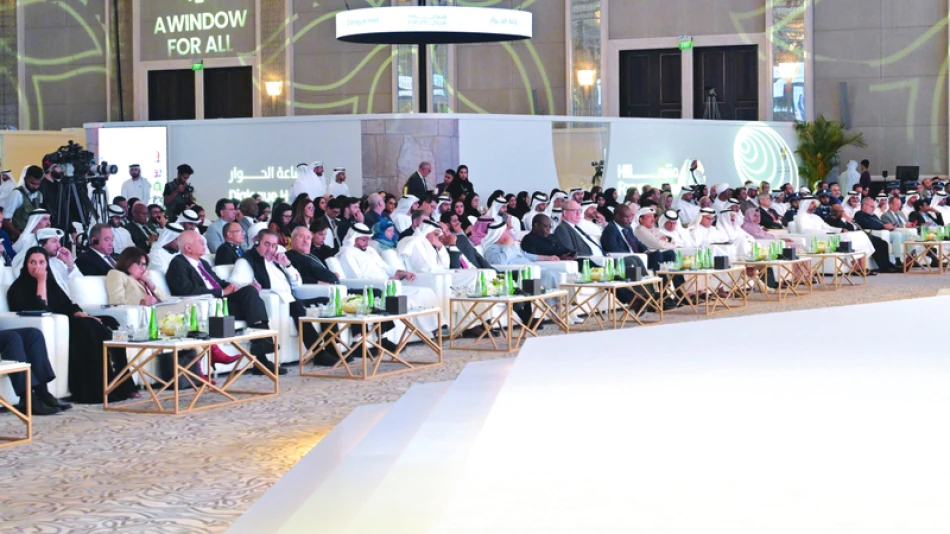
Lana Nasseeba: Peace Requires Dialogue, Not Aggression; Exclusion-Based Systems Lack Sustainability
UAE Positions Itself as Global Mediator in Tech-Driven World Order Reset
The UAE is asserting its diplomatic influence as a bridge-builder in an increasingly fragmented global landscape, using the second annual Healey Forum to advocate for international cooperation on artificial intelligence governance while taking firm stances on Middle East peace. The two-day summit, hosted by the Emirates Center for Strategic Studies and the Anwar Gargash Diplomatic Academy, brought together global leaders to discuss how emerging technologies are reshaping power dynamics and international relations.
Palestine Remains UAE's "Red Line" Despite Regional Realignments
Minister of State Lana Nusseibeh delivered one of the forum's most pointed messages, declaring that any attempts to annex Palestinian territories represent a "red line" for the UAE. This reaffirmation comes as the Emirates continues balancing its Abraham Accords normalization with Israel against broader Arab solidarity on Palestinian statehood.
"Peace cannot be achieved through aggression, nor can a system based on confrontation or exclusion endure," Nusseibeh stated, emphasizing that Palestine's future remains the cornerstone of any sustainable Middle East peace.
The UAE's position reflects a calculated diplomatic strategy: maintaining economic and technological partnerships with Israel while preserving credibility across the Arab world. This approach mirrors Singapore's model of principled pragmatism in Southeast Asian diplomacy.
Technology as the New Battleground for Global Influence
AI Governance Becomes Diplomatic Priority
Forum discussions highlighted how artificial intelligence and quantum computing are no longer purely technical matters but central to reshaping international power balances. Nicholai Mladenov, Director General of the Anwar Gargash Diplomatic Academy, emphasized that technology has become "a key element contributing to reshaping power balances and international relations."
This focus aligns with the UAE's broader strategy to position itself as a responsible AI leader, following its significant investments in generative AI and partnerships with major tech companies. The Emirates is essentially competing with Singapore, Switzerland, and other small states to become a trusted neutral ground for tech governance discussions.
Legal Frameworks Lag Behind Innovation
Dr. Narayanappa Janardhan from the diplomatic academy warned that modern technologies like AI and algorithmic systems pose unprecedented challenges to international humanitarian law. As warfare and peace concepts evolve in the digital age, new legal and ethical frameworks become essential to ensure responsible technology use while preserving fundamental human values.
This concern reflects growing global anxiety about autonomous weapons systems, deepfakes in information warfare, and AI-powered surveillance capabilities that could fundamentally alter conflict dynamics.
Market and Strategic Implications
UAE's Diplomatic Capital Investment Strategy
The forum represents more than academic discussion—it's part of the UAE's systematic investment in diplomatic infrastructure. By hosting high-level policy dialogues, the Emirates builds soft power that complements its economic diversification away from oil dependency.
For international businesses and investors, the UAE's positioning as a neutral mediator in tech governance disputes could prove valuable. Companies seeking to navigate US-China tech competition or EU regulatory frameworks may increasingly view the Emirates as a stable operational base with strong diplomatic connections across regions.
Regional Competition in Diplomatic Influence
The UAE's emphasis on dialogue and cooperation contrasts sharply with more confrontational approaches elsewhere in the region. While Saudi Arabia focuses on mega-projects like NEOM to attract global attention, the Emirates is building influence through consistent diplomatic engagement and policy forums.
This strategy positions the UAE as the region's primary interlocutor with Western powers on sensitive issues like AI governance, cybersecurity cooperation, and technology transfer policies.
Looking Forward: Sustainable Influence Through Principled Pragmatism
The forum's conclusion emphasized that technological progress requires international cooperation and cross-border partnerships to ensure deployment serves global stability and prosperity. This message reinforces the UAE's broader foreign policy approach: principled positions on core issues like Palestinian rights combined with pragmatic engagement across ideological divides.
Dr. Sultan Al-Nuaimi, Director General of the Emirates Center for Strategic Studies, positioned the forum as reflecting the UAE's historical role as a communication hub, stating that the country sits on land that "history has witnessed this communication for thousands of years."
As global power structures continue shifting, the UAE's investment in diplomatic dialogue platforms like the Healey Forum may prove prescient. Small states that can facilitate cooperation between major powers often punch above their weight in international affairs—a lesson the Emirates appears to have learned well.
Most Viewed News

 Sara Khaled
Sara Khaled






